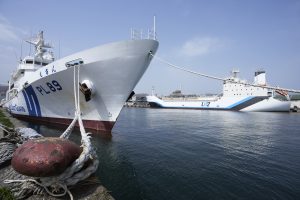On April 28, the Japanese government issued a “control guideline” clarifying the procedures for the Minister of Defense (MOD) to take control of the Japan Coast Guard (JCG) as well as the activities that the JCG may engage in under the control of the MOD in the event of an armed attack against Japan by a foreign power.
The guideline is based on Article 80, Paragraph 1 of the Self-Defense Forces Law, which stipulates that all or part of the JCG may be placed under the control of the MOD if the prime minister issues a mobilization order to the defense forces.
For example, if a foreign power were to invade Japan using armed force, the Japanese government would issue a mobilization order based on Article 76, Paragraph 1 of the Self-Defense Forces Law and acknowledge an “armed attack situations” by Cabinet decision. This would allow the Self-Defense Forces to exercise the necessary armed force under Article 88, Paragraph 1 of the Self-Defense Forces Law and the right to self-defense under international law to respond to the situation.
The Japanese government had not previously had in place a control guideline governing the activities of the JCG in the event of such a situation. The new guideline clarifies the role of the JCG and the activities in which it may engage in coordination with the Self-Defense Forces in a scenario in which a mobilization order has been issued.
The control guideline sets out the procedure for placing the JCG under the control of the MOD based on Cabinet decision. It cites five examples of the activities the JCG will engage in while under the control of the MOD: civil protection measures (evacuation and rescue of residents); search and rescue at sea; providing information and evacuation support to vessels; counterterrorism measures at port facilities; and measures to respond to large-scale refugee situations. Based on the information gathered and analyzed by the Ministry of Defense and Self-Defense Forces, the MOD commands the commandant of the JCG, who in turn directs and supervises JCG personnel in carrying out these activities. The guideline is designed to ensure that these activities are carried out by the JCG, allowing the Self-Defense Forces to focus on the need to use armed force to defend Japan.
The control guidelines state that the JCG will remain a law enforcement agency even under the control of the MOD and will continue to engage in law enforcement activities. Even under MOD control, the JCG will not become a military force. Therefore, although the JCG under the control of the MOD will operate in “wartime,” the status and activities of the JCG remain unchanged from those in peacetime. As such, the government concluded that it was unnecessary to amend the Japan Coast Guard Law, which is the law governing the establishment and operations of the JCG.
In a situation where a mobilization order has been issued and an armed attack is deemed to be underway, a variety of factors come into play when determining whether the activities of the JCG can be evaluated as law enforcement activities from an international law perspective, or more specifically, whether they constitute military activities under international law. These factors include the sea area, purpose, content, and effect of the activities in question. The fact that the status of the entity responding to a situation is that of a law enforcement agency as opposed to a military force does not automatically mean that the exercise of authority by that agency constitutes a law enforcement activity rather than a military activity under international law.

































